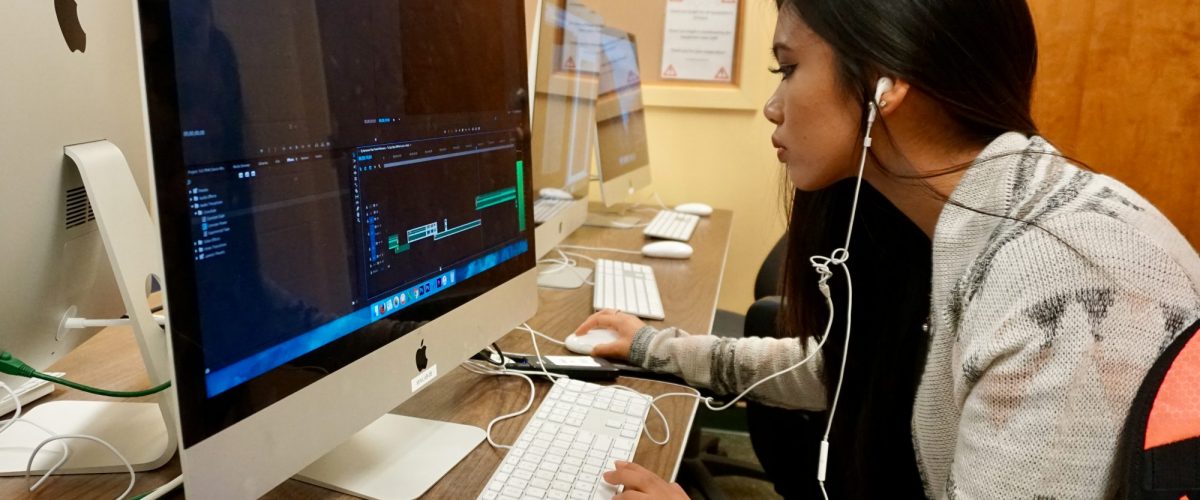M.S. Program
Take your experience and credentials to the next level by joining our diverse community of scholars, media creators, journalists, and professional communicators in the M.S. program. Advance your understanding of evidence- and theory-based approaches to communication fields via coursework, collaboration with exceptional faculty and peers, and an academic or applied, scholarly project.
Program Overview
Our Master of Science in Journalism and Media Communication welcomes a small cohort every year so we can help our students thrive as scholars and as people. Students make lasting connections in our classes, graduate office spaces, and with the Fort Collins community. Our students develop their own research projects and professional experiences through small class sizes and experiential learning. Graduate students can receive funding for tuition, insurance, and a salary stipend through teaching and research assistantships.
The M.S. in Journalism and Media Communication is for students interested in understanding media and communication theories, research, and best practices to apply to their existing or future careers. Additionally, our community of faculty and graduate students will help you expand your network, experiences, and connect you to new and exciting opportunities during your studies and after you graduate. As both a theoretical and applied scholarly program, you will can develop expertise in any of the following areas:
- Science Communication: Examines theories, processes, audiences, and methods to enhance the communication of science in areas of health, environment, agriculture, and more. See our Center for Science Communication.
- Strategic Communication: Focuses on strategies and issues in the disciplines of advertising and public relations. Includes audience research, persuasion, crisis communication, and public diplomacy.
- Storytelling, Media, and Democracy: Focuses on journalism practices, storytelling, storylistening, and media behaviors, attitudes, and ownership structure.
- Digital Culture and Identities: Examines the production of personal identities and cultural movements in digital spaces. Research includes performance and performativity theories, immersive technologies, game studies, technocultural discourse, digital narrative analysis, and persona studies.
- Academia: Preparation for higher-level academic work, such as obtaining a doctorate, and teaching and conducting research at the college level.
Course of Study
The residential M.S. requires 30 credits of coursework with options for either a thesis (Plan A) or research project (Plan B). Students are best served if they commit to one of the options no later than mid-term of their second semester of full-time study.
The program typically takes full-time students at least two years to complete. Part-time students take longer and arrange school schedules to accommodate other responsibilities. A suggested timeline for completion is available in the M.S. Student Manual.

Research Thesis Plan A Track
The research thesis option enables students to work closely with faculty members to conduct original research on a communication-related problem or issue. The topic of the research thesis varies according to each student’s interest, but all students hone their critical thinking, conceptual, and analytical skills throughout the thesis research and writing process. Upon completion, students defend the thesis in front of their faculty committee.
Research Project Plan B Track
The research project option allows students to work with an outside organization, typically the organization that is currently employing them. In the research project, the student uses communication theories and methods to solve a particular communication problem for that organization. Upon completing their research, students write a professional report for the organization and defend the report in front of their faculty committee.
Recent Theses
Students select the topic of their thesis based on their personal research interests and in consultation with Journalism and Media Communication faculty members. Copies of these theses may be accessed through the CSU Digital Repository, an open showcase of CSU student work.
- Effects of goal-framed and dynamic norm messages on national park campers' intentions to comply with wildlife attractant storage guidelines by Jordan Gorostiza (2023)
- Impact of the identifiable victim effect on audience willingness to donate to healthcare organizations via Instagram by Abby Konkel (2023)
- The Power of art for communicating complex health technologies by Stephanie Marie Scott (2022)
- Colorado journalists' application and understanding of guidelines for reporting on sensitive topics: Suicides by Sunday Miller (2022)
Recent Research Projects
Because students work with outside organizations on these projects, sometimes copies of these projects are not publicly accessible to protect the proprietary nature of the information. A sample of the project topics are below.
- La Venezuela de mi Corazón (The Venezuela of my Heart) by Hannah Tran (2023)
- CSU's Center for Autism Research and building a strong online community of parents/guardians of children with Autism Spectrum Disorder by Alina Timofte (2019)
- The CoolX Designer’s Manual Users’ Needs Assessment:
Merging Advanced Energy® and Excelsys Technical Documentation by Sally Runions (2018)
Funding
Several types of financial assistance are available to help students achieve their educational goals, including teaching and research assistantships, instructorships, and student loans.
Please visit our Graduate Resources section for additional information.
Curriculum
M.S. students are required to complete at least 30 credit hours of required and elective coursework. Required coursework includes a mixture of research methods and theory courses specific to journalism and media communication. These courses provide students with the foundational knowledge necessary to advancing their understanding and eventual application of theory and evidence-based techniques to effective communication processes, management, products, and impacts.
In addition to the required core of classes, students select elective coursework that is consistent with their goals and interests. For these elective courses, students may decide to take additional theory or research methods courses, or they may elect to take up to nine credit hours from 300- and 400- level skills courses (e.g., video production, infographic design, social media management, science communication) in the JMC department. The flexibility of this elective requirement enables students interested in both academic and professional careers to achieve their goals. A 3.0 GPA must be maintained throughout the M.S. degree.

How To Apply

Career Outcomes
Our graduates hold positions as:
- Public affairs/public relations and communication specialists for major corporations and government agencies
- Technical communicators for agricultural, engineering, software, chemical, and pharmaceutical firms
- Editors of specialized and in-house publications
- Public relations and development officers for non-profit organizations
- Communication specialists for colleges and universities
Our graduates have taken jobs with:
- Hewlett Packard
- Microsoft
- IBM
- National Academies of Sciences, Engineering, and Medicine
- U.S. Forest Service
- National Park Service
- National Oceanic and Atmospheric Administration
- Los Alamos National Laboratory
- National Ecological Observatory Network
- Bohemian Foundation
- Certified Angus Beef
- Larimer County Humane Society
- University of Colorado Health
- Many other companies and agencies
Graduates of our master’s program have also gained admittance to top-ranked Ph.D. programs. These programs include communication-related Ph.D. programs at the University of Wisconsin-Madison, Temple University, University of California-Berkley, Ohio State University, and the University of Alabama. In addition, several of our students have continued their education in our Ph.D. in Media Communication. Graduates have also pursued advanced degrees in other fields, including economics and sociology.